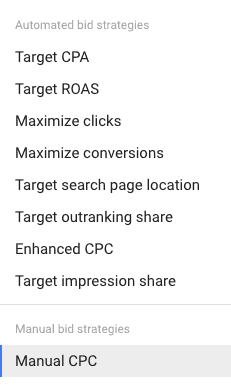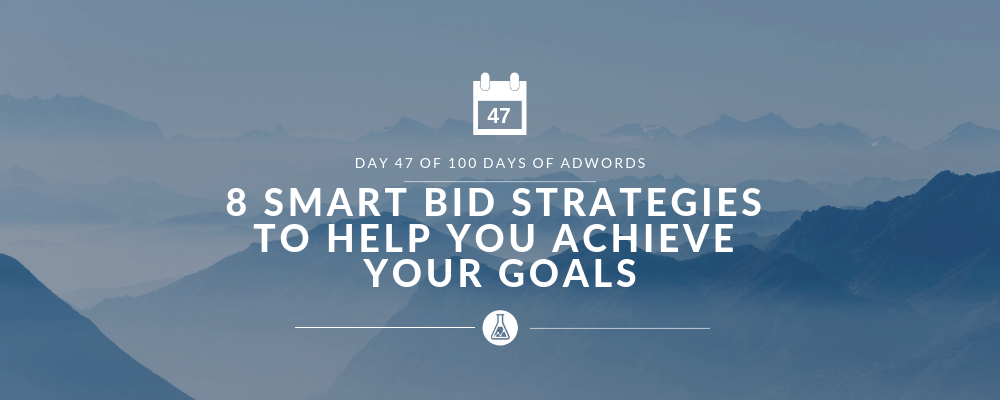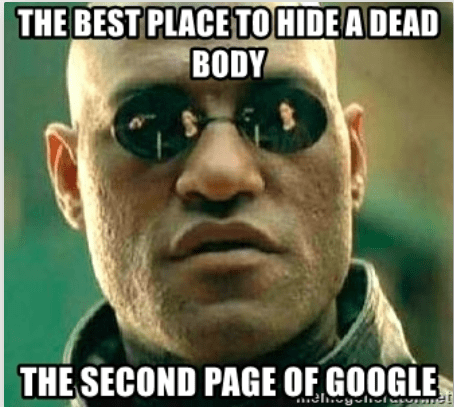Smart cars, smart TVs, SMART goals, smart people, smart ideas, smart money, and the list could go on. The word ‘smart’ is following us everywhere. So why not talk about smart bidding strategies?
Smart Bidding is the en vogue marketing concept that refers to Google Ads automated bid strategies. It uses machine learning to optimize for conversions or conversion value, all auction-based.
Back in 2015, we were talking about the math behind the perfect bid. Now it’s time to see how machine learning can make predictions to increase or decrease your bid, to lead to the perfect bid so you can take full advantage of these advanced algorithms.
Table of Contents
Plus, leaving manual bidding behind means that search marketers can now spend more time thinking bigger and developing more advertising strategies.
The Perks of Being One of the Google Ads Smart Bid StrategIES
Even for an experienced PPC specialist, trying an automated AdWords bidding strategy for the first time may seem like this (sorry, Google Ads, it’s gonna take a while to get used to your new name).
However, do you know what is the greatest superpower of these advanced machine learning algorithms? They use auction based signals, meaning a wide range of contextual real-time signals, such as:
- Device
- Browser
- Location intent
- Physical location
- Weekday and time of day
- Web Placement (Display)
- Site behavior
- Product attributes (Shopping)
- Remarketing lists
- Actual search query
- Ad characteristics
- Demographics
- Search Network Partner
- Price competitiveness (soon for Shopping)
- Seasonality (soon for Shopping)
- Mobile App ratings (soon)
Now, beat that with manual CPC! Google knows much more about the people we target than we do.
What are the Google Ads Automated Bidding strategies and when to use them
As of today, there are 8 automated bid strategies in Google Ads, designed to fulfill your business goals.

Now, if I were asked to pick one strategy to recommend, I’d say it’s a wrong question. Each smart bid option addresses different business goals with different campaign goals.
Let’s go through all of them and see which one suits you best.
1. Target CPA
This automated bidding strategy’s super-power is that it sets optimal bids to help you get as many conversions as possible, while staying in a Target CPA (Target Cost per Acquisition) you set, avoiding traffic that doesn’t result in a conversion.
This happens by looking at historical data from your campaign (or from your account if it’s a new campaign) and evaluating all contextual signals in real time. So, if your goal is to increase conversions at a certain CPA, this might be for you.

Some tips and tricks when setting this strategy:
- Set a realistic Target CPA, otherwise, your campaign could under-perform;
- Make sure you have at least 30 conversions in the last 30 days, so you can maximize results;
- Once the Target CPA is set, have another look at your campaign’s daily budget. You may want to increase or decrease it accordingly, so you don’t get surprised the next day when running the spending reports. Your daily budget should be at least 10x your target CPA. If your strategy is constrained by the campaign’s budget, it may under-perform as well;

- Wait for 1 week for the strategy to learn, for another 2 weeks for it to adapt and after 3 weeks, run a performance report comparing the time before with the one after. Try not to make any changes during this time;
- After the strategy is stable, try not to change more than 20% at a time;
- Keep in mind that tCPA works best in high volume campaigns.
2. Target ROAS
This Google Ads Smart Bidding strategy helps you get more conversion value or revenue at the target return-on-ad-spend (ROAS) you set.
If you don’t know how to calculate your Target ROAS, here’s the article where you’ll find out how.
This strategy is great to use when you value each conversion differently. It’s suitable for retail, finance or travel industries, or any industry you’re interested in increasing sales and profit while ensuring maximum value for your customers.
Because better ROAS = more profit = more cha-ching.
The recommendation here is to have a minimum of 50 conversions in the last 30 days.
3. Maximize clicks
Choosing the Maximize Clicks strategy will empower Google to automatically set your bids to get as many clicks as possible within your budget.
This one is extremely useful if your business goal is to create awareness and increase site visits.
4. Maximize conversions
Maximize Conversions is the bidding method that automatically sets bids to bring you more conversions while spending your budget, without taking into consideration the CPA.
This is ideal if your goal is to increase conversions, no matter the CPA.
5. Target search page locations
‘Where do you hide a dead body?
– In the second page of Google search results page’
Opt for the Target search page locations if you want Google to automatically set bids to show your ad on the top of the page or on the first page of Google search results.
6. Target outranking share
The super-power of the Target outranking share option is to automatically outbid one of your competitors so your ad can rank higher or show when the competitor’s ad does not. You can only outrank one domain at a time. This AdWords automated bidding strategy could be useful if having a better offer than a competitor’s.
I remember when we first used this smart bid strategy, a long time ago, while it was still in beta.
Our client was running a 7-day promotion on several items, and we had a better price compared to one of our competitors, so we decided to test this strategy and outbid him, in 50% of the auctions.
Guess what, the strategy worked. Our CTR was higher, our average position improved, so did our conversions. We successfully outranked the enemy, but please, don’t ask what were the costs. Did I mention the 66% increased avg. CPC? Ok, if you insist, I’ll just say that the CPA was 3x higher.
So, the main takeaway from this classic story: don’t run this strategy unless you give it enough time to learn and optimize, and, of course, have some extra budget.
7. Enhanced CPC
The Enhanced CPC (or ECPC) strategy adjusts your manual bids to help you get the maximum conversions. Basically, it raises your manual bids when it’s likely to lead to a sale or another conversion on your website, and lowers your bids in situations unlikely to lead to a conversion.
This one is suitable if your goal is to increase conversions, but still, hold the reins of your keywords bids. Here’s an article where you’ll find out how to start with a profitable maximum CPC.
Even though this AdWords strategy is supposed to increase your conversion rate, most of the times we used it, we saw more expensive conversions, due to the fact that maybe it bids more aggressively.
8. Target Impression Share
Target Impression Share is the newbie smart bid whose superpower is to increase your visibility and put you in the spotlight. It automatically sets your bids to show your ad, based on your placement settings:
- on the absolute top of the page
- on the top of the page
- or anywhere on the page of Google search results.
So, while other AdWords automated bidding strategies focus on increasing conversions, sales or clicks, this one focuses on increasing visibility and brand awareness, by helping ads show more often.
We live, breathe & Dream Paid Traffic
BONUS TIP: RANKING THE AUTOMATED BID TYPES
After exposing numerous campaigns across several accounts to the various and often misunderstood automated bidding types, we’ve come up with what we believe to be a fairly accurate ranking, and a solid guide for where you can start with them.
We assume the broken record role here to make sure you understand that results always vary, so please take these rankings with a grain of salt.
Target CPA
We recommend creating this through a Portfolio Bid Strategy, instead of simply toggling it on at the campaign level. When you create it at the Portfolio Bid Strategy level and then apply it, you can implement a higher level of control, by putting a cap on the Maximum CPC under “Advanced Settings”. This helps ensure your spending will not explode while the system learns how to hit your target.
Maximize Conversions
This one is great if you have a lot of conversion volume with a low time lag between click and conversion (if you’re a retail business, for example).
One issue to be aware of, is there is no Target CPA set; the system just basically attempts to max out on as many conversions as possible (regardless of CPA). For high converting accounts with a low time lag, this hasn’t seemed to be a huge issue. For accounts with longer time lags, the CPA could go up.
Enhanced CPC (ECPC)
This is a milder form of the smart bidding strategies, because you can set a guiding CPC. However, due to recent changes, bid adjustments can be upwards of 100% of the benchmark CPC (especially with broad match or modified broad match keywords). So, if you have the conversion volume, we would recommend jumping right up the list to Target CPA.
Target ROAS
This one is pretty variable on its success. From our understanding, the Google team has been working to make improvements to this bid strategy (especially on the Shopping Campaigns side). However, something to keep in mind with this strategy, people oftentimes are too aggressive with their ROAS goal or don’t really understand how they’ve come to choose that number.
Make sure your Target ROAS is realistic based on historical data! If a well maintained campaign for your product has never yielded over a 3X return, setting the target ROAS at 7X isn’t a great place to start, and likely to make success difficult to attain.
Heading into 2019, we still hold out hope for this bid type, specifically on the Shopping Network, as Google continues to refine the algorithm.
Target Search Page Location
People sometimes use this for their Branded Campaigns, but we haven’t seen it work very well to this point. It’s not conversion-focused enough, and oftentimes it increases the CPC for lower volume campaigns, while implicitly lowering the ROI.
Empower and trust the algorithms to work, while keeping in mind to:
- Check your ROI goals. The best PPC bidding option for you depends on your business objectives;
- Consider the budget you want to spend and check your daily budget amount. You don’t want to see a budget-constrained campaign that will mess up your bid strategy, neither a huge increase in daily spend;
- Make sure you have conversion tracking set up;
- Have a clean campaign structure, ads, and keywords, as well as great landing pages;
- Start as an experiment, 50/50 split traffic;
- Have patience. You won’t see results right away (maybe just an increased cost). The machines need time to learn. The more conversions and data, the faster and accurately they will be;
- Make small adjustments;
- Constantly monitor the performance, as it may over-perform or under-perform your expectations;
- You can also group campaigns and try a portfolio bidding strategy.
- Don’t give up!
Once more, choose the smart bidding strategy in a SMART way:
- Set achievable business goals
- Mind the gap between manual CPC and automated bidding
- Algorithms should be given a chance
- Run reports to monitor performance
- Test, test, test!
Final thoughts on Google Ads Smart Bidding
From my experience, sometimes you might have mixed feelings that Google only wants you to spend more money with these automated bid strategies, while you only get higher CPAs.
But actually, sometimes you may be surprised by how well it works. The truth is that the algorithms are improving day by day and the more data you have, the merrier. It may seem like a huge step to switch from the comfort of your manual bids to trusting the machine bids. Just remember that you are still in control. You know your business best and now you can spend more time thinking about what strategy to apply to best suit your objectives.
So, if you haven’t tested them yet, come on, off you pop into this sweet candy bar (just remember to choose the ‘healthier’ sweets for your business). Or if you did, please share with us your experiences.
If you can’t decide what Google Ads bidding strategy suits you most and you want to maximize your goals, you can request a PPC proposal and we’ll gladly come up with suggestions to improve your account.
Curious to see more PPC content like this? Hit the subscribe button below and stay up to date with all the industry’s news and best practices.






